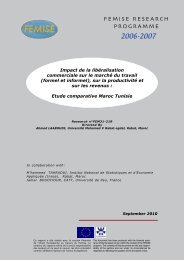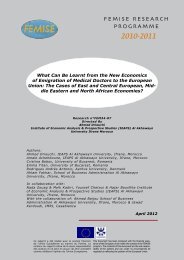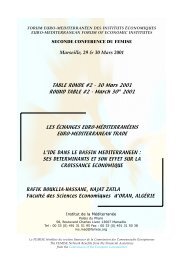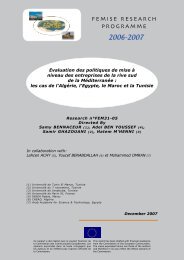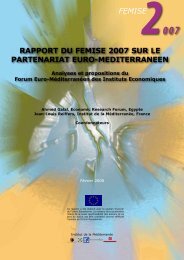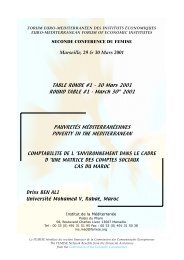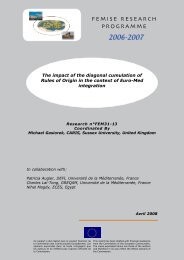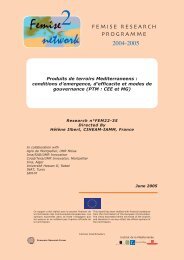- Page 1 and 2: 2 F E M I S E R E S E A R C H P R O
- Page 3 and 4: The study was carried out by a work
- Page 5 and 6: 2.3. Aggregation of indicators: Pri
- Page 7 and 8: 11873_02 Study D2: Poverty, Informa
- Page 9 and 10: 11873_02 Study D2: Poverty, Informa
- Page 11 and 12: 11873_02 Study D2: Poverty, Informa
- Page 13 and 14: 11873_02 Study D2: Poverty, Informa
- Page 15 and 16: 11873_02 Study D2: Poverty, Informa
- Page 17 and 18: 11873_02 Study D2: Poverty, Informa
- Page 19 and 20: 11873_02 Study D2: Poverty, Informa
- Page 21 and 22: 11873_02 Study D2: Poverty, Informa
- Page 23 and 24: 11873_02 Study D2: Poverty, Informa
- Page 25 and 26: 11873_02 Study D2: Poverty, Informa
- Page 27 and 28: 11873_02 Study D2: Poverty, Informa
- Page 29 and 30: 11873_02 Study D2: Poverty, Informa
- Page 31 and 32: 11873_02 Study D2: Poverty, Informa
- Page 33 and 34: 11873_02 Study D2: Poverty, Informa
- Page 35 and 36: 11873_02 Study D2: Poverty, Informa
- Page 37 and 38: 11873_02 Study D2: Poverty, Informa
- Page 39 and 40: 11873_02 Study D2: Poverty, Informa
- Page 41 and 42: 11873_02 Study D2: Poverty, Informa
- Page 43 and 44: 11873_02 Study D2: Poverty, Informa
- Page 45 and 46: 11873_02 Study D2: Poverty, Informa
- Page 47 and 48: 11873_02 Study D2: Poverty, Informa
- Page 49 and 50: 11873_02 Study D2: Poverty, Informa
- Page 51: 11873_02 Study D2: Poverty, Informa
- Page 55 and 56: 11873_02 Study D2: Poverty, Informa
- Page 57 and 58: 11873_02 Study D2: Poverty, Informa
- Page 59 and 60: APPENDIX
- Page 61 and 62: Table 2 - Population Distribution b
- Page 63 and 64: Table 7 Gross Domestic Product at F
- Page 65 and 66: Table 9 Investment and Saving durin
- Page 67 and 68: Table 12: Income, Distribution and
- Page 69 and 70: Table 15-c: Poverty measures by edu
- Page 71 and 72: Table 20 : Housing conditions by po
- Page 73 and 74: Table 24 The Number of Crimes Repor
- Page 75 and 76: Rank Country CPI 2002 score Surveys
- Page 77 and 78: Table 26 Maternal Health Indicators
- Page 79 and 80: JORDAN Royal Scientific Society
- Page 81 and 82: 11873_2002 Study D2: Poverty, Infor
- Page 83 and 84: 11873_2002 Study D2: Poverty, Infor
- Page 85 and 86: 11873_2002 Study D2: Poverty, Infor
- Page 87 and 88: 11873_2002 Study D2: Poverty, Infor
- Page 89 and 90: 11873_2002 Study D2: Poverty, Infor
- Page 91 and 92: 11873_2002 Study D2: Poverty, Infor
- Page 93 and 94: 11873_2002 Study D2: Poverty, Infor
- Page 95 and 96: 11873_2002 Study D2: Poverty, Infor
- Page 97 and 98: 11873_2002 Study D2: Poverty, Infor
- Page 99 and 100: 11873_2002 Study D2: Poverty, Infor
- Page 101 and 102: 11873_2002 Study D2: Poverty, Infor
- Page 103 and 104:
11873_2002 Study D2: Poverty, Infor
- Page 105 and 106:
11873_2002 Study D2: Poverty, Infor
- Page 107 and 108:
11873_2002 Study D2: Poverty, Infor
- Page 109 and 110:
Population Projection 2000 - 2005 Y
- Page 111 and 112:
Distribution of Population Living i
- Page 113 and 114:
Total Jordanians Non jordanians Tot
- Page 115 and 116:
Table 3 - Growth Rates of Economic
- Page 117 and 118:
Contribution of Economic Sectors to
- Page 119 and 120:
Table 1 Main Economic Indicators (C
- Page 121 and 122:
Table 2 Expenditure on Gross Domest
- Page 123 and 124:
Table 30 Components of Public Expen
- Page 125 and 126:
Table 32 Outstanding External Publi
- Page 127 and 128:
Table 34 Distribution of External L
- Page 129 and 130:
11873_2002 Study D2: Poverty, Infor
- Page 131 and 132:
11873_2002 Study D2: Poverty, Infor
- Page 133 and 134:
Table 2 - The Composition of Greek
- Page 135 and 136:
11873_2002 Study D2: Poverty, Infor
- Page 137 and 138:
11873_2002 Study D2: Poverty, Infor
- Page 139 and 140:
11873_2002 Study D2: Poverty, Infor
- Page 141 and 142:
Table 4: Health (and Pension) Insur
- Page 143 and 144:
Table 5: Composition (%) of Health
- Page 145 and 146:
Table 6 Estimated ‘’Unregistere
- Page 147 and 148:
11873_2002 Study D2: Poverty, Infor
- Page 149 and 150:
11873_2002 Study D2: Poverty, Infor
- Page 151 and 152:
11873_2002 Study D2: Poverty, Infor
- Page 153 and 154:
11873_2002 Study D2: Poverty, Infor
- Page 155 and 156:
11873_2002 Study D2: Poverty, Infor
- Page 157 and 158:
Table 8 Crimes recorded in criminal
- Page 159 and 160:
11873_2002 Study D2: Poverty, Infor
- Page 161 and 162:
11873_2002 Study D2: Poverty, Infor
- Page 163 and 164:
11873_2002 Study D2: Poverty, Infor
- Page 165 and 166:
11873_2002 Study D2: Poverty, Infor
- Page 167 and 168:
11873_2002 Study D2: Poverty, Infor
- Page 169 and 170:
11873_2002 Study D2: Poverty, Infor
- Page 171 and 172:
11873_2002 Study D2: Poverty, Infor
- Page 173 and 174:
11873_2002 Study D2: Poverty, Infor
- Page 175 and 176:
11873_2002 Study D2: Poverty, Infor
- Page 177 and 178:
11873_2002 Study D2: Poverty, Infor
- Page 179 and 180:
11873_2002 Study D2: Poverty, Infor
- Page 181 and 182:
11873_2002 Study D2: Poverty, Infor
- Page 183 and 184:
7. STATISTICAL ANNEX
- Page 185 and 186:
Table A2 - Population in Greece by
- Page 187 and 188:
Table A4 - Incidence of Poverty (Pe
- Page 189 and 190:
11873_2002 Study D2: Poverty, Infor
- Page 191 and 192:
11873_2002 Study D2: Poverty, Infor
- Page 193 and 194:
11873_2002 Study D2: Poverty, Infor
- Page 195 and 196:
11873_2002 Study D2: Poverty, Infor
- Page 197 and 198:
11873_2002 Study D2: Poverty, Infor
- Page 199 and 200:
11873_2002 Study D2: Poverty, Infor
- Page 201 and 202:
11873_2002 Study D2: Poverty, Infor
- Page 203 and 204:
11873_2002 Study D2: Poverty, Infor
- Page 205 and 206:
11873_2002 Study D2: Poverty, Infor
- Page 207 and 208:
11873_2002 Study D2: Poverty, Infor
- Page 209 and 210:
11873_2002 Study D2: Poverty, Infor
- Page 211 and 212:
11873_2002 Study D2: Poverty, Infor
- Page 213 and 214:
11873_2002 Study D2: Poverty, Infor
- Page 215 and 216:
11873_2002 Study D2: Poverty, Infor
- Page 217 and 218:
11873_2002 Study D2: Poverty, Infor
- Page 219 and 220:
11873_2002 Study D2: Poverty, Infor
- Page 221 and 222:
11873_2002 Study D2: Poverty, Infor
- Page 223 and 224:
11873_2002 Study D2: Poverty, Infor
- Page 225 and 226:
11873_2002 Study D2: Poverty, Infor
- Page 227 and 228:
11873_2002 Study D2: Poverty, Infor
- Page 229 and 230:
6. ANNESSO STATISTICO
- Page 231 and 232:
Tab. 1 - Struttura per età della p
- Page 233 and 234:
Tab. 3 - Struttura per età della p
- Page 235 and 236:
Tab. 5 - Principali indicatori soci
- Page 237 and 238:
Tab.5 (segue)- Principali indicator
- Page 239 and 240:
Tab. 6 - Cittadini stranieri reside
- Page 241 and 242:
Tab. 8 - Popolazione per classe d'e
- Page 243 and 244:
Tab. 10 - Andamento del Prodotto In
- Page 245 and 246:
Tab. 12 - Reddito disponibile - Ann
- Page 247 and 248:
Tab. 14 - Popolazione secondo la ri
- Page 249 and 250:
Tab. 16 - Tassi di disoccupazione p
- Page 251 and 252:
Tab. 18 - Assicurati e pensionati,
- Page 253 and 254:
SALUTE
- Page 255 and 256:
Tab. 21 - Andamento della diffusion
- Page 257 and 258:
Tab. 23 - Andamento dei casi di Aid
- Page 259 and 260:
Tab. 25 - Distribuzione degli istit
- Page 261 and 262:
Tab. 27 - Attività di medicina di
- Page 263 and 264:
POVERTÀ
- Page 265 and 266:
Tab. 30 Fonte: Istat
- Page 267 and 268:
Tab. 32 Fonte: Istat
- Page 269 and 270:
Tab. 34 Fonte: Istat
- Page 271 and 272:
Tab. 36 Fonte: Istat
- Page 273 and 274:
Tab. 38 Fonte: Istat
- Page 275 and 276:
Tab. 40 Fonte: Istat
- Page 277 and 278:
Tab. 42 Fonte: Istat
- Page 280 and 281:
CRIMINALITÀ
- Page 282 and 283:
Segue tab. 44 1995 1996 1997 1998 1
- Page 284 and 285:
Segue tab. 44 1995 1996 1997 1998 1
- Page 286 and 287:
Segue tab. 45 1995 1996 1997 1998 1
- Page 288 and 289:
Tab. 46 - Detenuti Presenti al 31 d
- Page 290 and 291:
Tab. 47 - Condannati per distretto
- Page 292 and 293:
Tab. 49 - Condannati per distretto
- Page 294 and 295:
11873_2002 Study D2: Poverty, Infor
- Page 296 and 297:
TURKEY Selahattin Bekmez, Ph.D. - C
- Page 298 and 299:
11873_2002 Study D2: Poverty, Infor
- Page 300 and 301:
Table 3: Turkish Citizen Working an
- Page 302 and 303:
11873_2002 Study D2: Poverty, Infor
- Page 304 and 305:
Table 5: Real GNP by Main Kind of E
- Page 306 and 307:
Table :7 İmport-Export Values (mil
- Page 308 and 309:
11873_2002 Study D2: Poverty, Infor
- Page 310 and 311:
11873_2002 Study D2: Poverty, Infor
- Page 312 and 313:
Table 1: Existing Status and Object
- Page 314 and 315:
Table 2: Number of Doctors an numbe
- Page 316 and 317:
Table 3: Heath Expenditures per yea
- Page 318 and 319:
Table 7: Distribution of Cancer Cas
- Page 320 and 321:
11873_2002 Study D2: Poverty, Infor
- Page 322 and 323:
11873_2002 Study D2: Poverty, Infor
- Page 324 and 325:
11873_2002 Study D2: Poverty, Infor
- Page 326 and 327:
11873_2002 Study D2: Poverty, Infor
- Page 328 and 329:
11873_2002 Study D2: Poverty, Infor
- Page 330 and 331:
11873_2002 Study D2: Poverty, Infor
- Page 332 and 333:
11873_2002 Study D2: Poverty, Infor
- Page 334 and 335:
11873_2002 Study D2: Poverty, Infor
- Page 336 and 337:
TABLE II - Sentenced Juveniles Rece
- Page 338 and 339:
11873_2002 Study D2: Poverty, Infor
- Page 340 and 341:
11873_2002 Study D2: Poverty, Infor
- Page 342 and 343:
11873_2002 Study D2: Poverty, Infor
- Page 344 and 345:
11873_2002 Study D2: Poverty, Infor
- Page 346:
11873_2002 Study D2: Poverty, Infor



